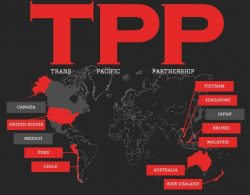By Aurélie Sarrabezolles, Research Director
We thought the Trans-Pacific Partnership (TPP) had been withdrawn, since the U.S., following the presidential election, decided to walk away from it. This is no longer the case. Canada, Japan, Mexico, Australia, New Zealand, Chile, Peru, Brunei, Malaysia, Singapore and Vietnam are the countries still negotiating this harmful deal. Japan is the biggest player and has decided to go ahead without the U.S.
As for the Canadian Liberal government, it being pro trade to the detriment of Canadian workers, it’s also pushing for negotiations of the TPP. Meetings behind closed doors with trade officials were held in Toronto at the beginning of May. The IAM is highly critical of that opaque process and demands that trade unions to be included in the negotiations process.
We know what past free trade agreements (FTAs) did to the Canadian economy, neglecting its workforce and disseminating the manufacturing sector. As pointed out by Andrew Jackson from the Broadbent Institute: ‟[t]he big losers have been mid-skilled workers in the advanced industrial countries who have experienced job losses and wage stagnation as manufacturing production and new manufacturing investment have shifted to low wage developing countries. Increased North-South trade, especially with China, now the workshop of the world, has exerted major downward pressures on wages and pushed surviving manufacturing operations in advanced economies to become much more capital intensive, further squeezing employment.’’
While the TPP is now back on the trade officials’ negotiation table, Canada is considering signing a bilateral agreement with China and started discussions with Japan in 2012 on the Canada-Japan Economic Partnership Agreement (CJEPA).
The Trade in Services Agreement or TiSA is another plurilateral agreement and is still in negotiations. This major agreement involves the liberalization and deregulation of services in the following partner countries: Canada, the U.S., the European Union (i.e. Belgium, France, Greece, Hungary, Germany, Austria, Bulgaria, Croatia, Cyprus, Czech Republic, Slovak Republic, Finland, Latvia, Italy, Ireland, Lithuania, Poland, Portugal, Slovenia, Spain, Luxembourg, Romania, Netherlands, Sweden, Estonia, Denmark, Malta and United Kingdom), Australia, Chile, Colombia, Costa Rica, Hong Kong, Iceland, Israel, Japan, Liechtenstein, Mauritius, Mexico, New Zealand, Norway, Pakistan, Panama, Peru, Korea, Switzerland, Taiwan, and Turkey.
A new campaign recently launched by the International Transport Workers’ Federation or ITF called TiSA means trouble. It denounces the non-transparent process of negotiation rounds between the 22 countries involved in it and the danger facing workers should TiSA be ratified.
As part of the 2017 Summit Progress, The Great Debate on free trade was held on April 7, 2017. The question put to the test of the panelists was ‟whether trade deals have actually been in the public interest.” Con sides put the emphasis on the lack of inclusion of unions in the negotiations process and recognition of workers’ rights entrenched in FTAs. The Trudeau Government keeps on saying that they are all for ‟progressive free trade” agreements, they have yet to demonstrate it and include trade unions in the decision-making process of those FTAs.
-30-



